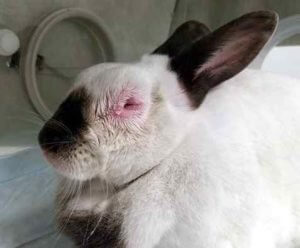What is Myxomatosis and how do I keep my rabbit safe?
There has recently been an emergence of Myxomatosis affecting rabbits in the innerwest, if you are a rabbit owner you might want to read the following to ensure your furry friend stays safe and healthy.
About Myxomatosis
Myxomatosis was a virus introduced to Australia in the 50’s to control the feral rabbit population, unfortunately it is still prevalent today and can affect domesticated rabbits. Successful treatment for it is rare in affected rabbits and once present it has a rapid progression leading to death within 14 days. As such, prevention is the key focus when tackling Myxomatosis.
How is it spread?
Myxomatosis can be transferred via the affected rabbit coming into close contact with other rabbits. It can also be transferred by insect bites such as from mosquitoes or fleas.
Can I vaccinate my rabbit against it?
Unfortunately there are no vaccinations available in Australia to protect against Myxomatosis however there are a few safety measures available to keep your rabbit as safe as possible.

An example of a mosquito proofed hutch
- Install a fly/insect net around your rabbits outdoor enclosures
- Keep your rabbit indoors especially during summer or in the early mornings and evenings when mosquitos and fleas are most prominent.
- Stay up to date with your rabbits flea protection – speak to your vet about which product and dosage is safe for your rabbit as certain flea-preventative medications can have adverse affects on rabbits.
- Ask your vet about rabbit friendly insect-repellant.
How do I know if my rabbit is affected?
If you suspect your rabbit may have the virus it is important to bring it to a vet ASAP to prevent its suffering and to separate it immediately from other rabbits.
Common symptoms to look out for include:
- Pus-like discharge from eyes, nose, genitals and anus

Watery eyes in affected rabbit
- Watery eyes
- Swollen eyes and genitals
- Inappetence
- High fever
- Drooping and swollen ears
- Laboured breathing in more advanced stages
(More symptom pictures and further information on rabbit vaccinations)
